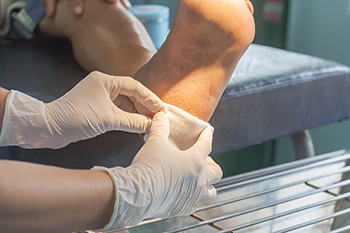
Diabetics can reduce the risk of developing foot ulcers by adopting proactive foot care measures. Regularly inspecting the feet for any signs of injury, such as cuts, blisters, or redness, and promptly having any wounds checked is imperative. Maintaining proper foot hygiene, including washing and thoroughly drying the feet daily, helps prevent infections. Wearing well-fitting, supportive footwear and avoiding walking barefoot further lowers the risk of developing ulcers. Additionally, managing blood sugar levels through diet, exercise, and medication is essential for overall diabetes management and minimizing complications. The prevalence of diabetic foot ulcers is significant, with complications ranging from infections to more severe issues like gangrene, which may necessitate amputation if left untreated. Regular visits to a podiatrist for foot assessments and care are essential for diabetic individuals, with frequency determined by the severity of their condition and individual risk factors. If you have diabetes and experience foot ulcers, it is strongly suggested that you schedule an appointment with a podiatrist for treatment.
Wound care is an important part in dealing with diabetes. If you have diabetes and a foot wound or would like more information about wound care for diabetics, consult with one of our podiatrists from Sutera and Jones Surgical Podiatry. Our doctors will assess your condition and provide you with quality foot and ankle treatment.
What Is Wound Care?
Wound care is the practice of taking proper care of a wound. This can range from the smallest to the largest of wounds. While everyone can benefit from proper wound care, it is much more important for diabetics. Diabetics often suffer from poor blood circulation which causes wounds to heal much slower than they would in a non-diabetic.
What Is the Importance of Wound Care?
While it may not seem apparent with small ulcers on the foot, for diabetics, any size ulcer can become infected. Diabetics often also suffer from neuropathy, or nerve loss. This means they might not even feel when they have an ulcer on their foot. If the wound becomes severely infected, amputation may be necessary. Therefore, it is of the upmost importance to properly care for any and all foot wounds.
How to Care for Wounds
The best way to care for foot wounds is to prevent them. For diabetics, this means daily inspections of the feet for any signs of abnormalities or ulcers. It is also recommended to see a podiatrist several times a year for a foot inspection. If you do have an ulcer, run the wound under water to clear dirt from the wound; then apply antibiotic ointment to the wound and cover with a bandage. Bandages should be changed daily and keeping pressure off the wound is smart. It is advised to see a podiatrist, who can keep an eye on it.
If you have any questions, please feel free to contact one of our offices located in Media, Glen Mills, Riddle Memorial Hospital, and Concordville, PA . We offer the newest diagnostic and treatment technologies for all your foot care needs.
